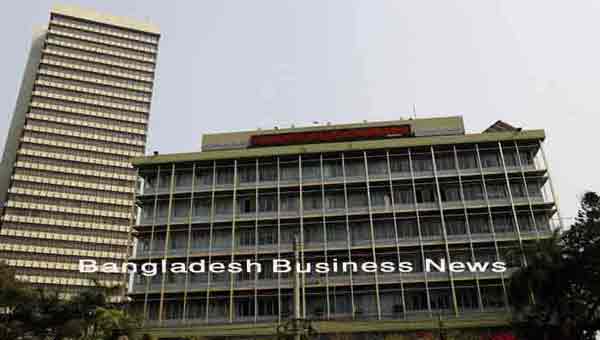

Bangladesh Bank Headquarters
Dhaka, Bangladesh (BBN) - The central bank of Bangladesh assumes that political tensions centring on next national election will be insignificant and hence economic growth and inflation are likely to remain stable in this fiscal year (FY).
“Looking ahead, growth and inflation outlook would likely remain relatively favourable in FY 2018-19, assuming no significant pickup in election-related political tension,” the Bangladesh Bank (BB) said in its quarterly update for April-June period of 2018.
The World Bank (WB) and senior economists, however, view the upcoming election as a domestic risk factor that may affect business confidence and investment, if the polls are not inclusive.
“With election approaching, a major domestic risk is the weakening of ongoing efforts to improve economic governance,” the WB said in its latest Bangladesh Development Update, released in Dhaka on Tuesday.
“This could affect confidence and investment,” the WB added.
Bangladesh’s economy might face challenges, if no inclusive general election could be held, according to Mustafa K Mujeri, former director general of Bangladesh Institute of Development Studies (BIDS).
He also said the election system of Bangladesh was yet to be institutionalized and resultantly a possible uncertainty was still looming.
“Possible risks from both domestic and external sectors should be considered for ensuring macro-economic stability in the near future,” Dr. Mujeri, also former chief economist of the central bank, explained.
The central bank has indentified global trade conflicts along with monetary tightening in the advanced economies as downside risks for achieving maximum economic growth in Bangladesh.
“Downside risks to growth from global trade conflicts, monetary tightening in the advanced economies and any broad-based pick-up in emerging market vulnerabilities remain,” it warned.
The BB has recommended that policy makers ensure macro-financial stability in the face of a sizeable current account deficit while the changing global liquidity conditions would require continued vigilance.
Despite a rebound in exports and strong remittance inflows, the deficit in current account balance widened to US$9.78 billion (around 3.0 per cent of GDP) in FY18.
It was driven mainly by a sharp increase in infrastructure-related imports in connection with implementation of the government’s mega projects, higher food imports due to last year's floods and rising global commodity prices, according to the central bank latest report.
However, a favourable financial account surplus moderated the overall balance to a deficit of around $0.7 billion, it added.
“Looking ahead, strong economic activities in some of the Middle Eastern economies and the Government's efforts to reduce the cost of remittance are expected to support remittance inflows, moderating current account deficit and boosting domestic demand and growth,” the BB added.
It also said stronger global growth momentum could support Bangladesh's export, although trade-related conflicts clouded the short-to-medium-term outlook.
“Import payments are expected to moderate as food and other one-off imports taper off over the coming quarters,” it predicted.
BBN/SSR/AD